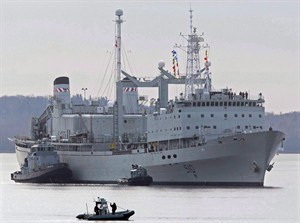
HMCS Preserver, one of Canada's operational support ships, designed to carry large amounts of fuel, provisions, and dry stores during naval operations, is pushed by tugs in Halifax harbour on Wednesday, Oct. 19, 2011. It took more than five hours to stop a navy ship from leaking fuel into the Halifax harbour last year because officers failed to ensure there was enough lighting, didn't position lookouts properly and then failed to react quickly, says a final report into the spill. THE CANADIAN PRESS/Andrew Vaughan
September 22, 2012 - 5:00 AM
HALIFAX - It took more than five hours to stop a navy ship from leaking fuel into the Halifax harbour last year because officers failed to ensure there was enough lighting, didn't position lookouts properly and then failed to react quickly, says a final report into the spill.
The final investigation into the March 16, 2011, incident says the diesel leak from HMCS Preserver started at 3:37 a.m. But it wasn't detected until about 6:30 a.m., when ship staff began investigating a discharge of what they thought was grey water coming from a drainage pipe on the starboard of the supply vessel.
The ship's commander spotted a sheen on the water about an hour later, but the pipe wasn't plugged until 90 minutes after that, according to the report, which was obtained under access-to-information legislation.
"Too much time elapsed (almost three hours) between the initial discovery (6:30 a.m.) of the overboard discharge and the fuel spill procedures being initiated (08:45 a.m.) allowing for an additional release of more than 5,800 litres of diesel fuel oil (more than 40 per cent of the total quantity spilled)," Cmdr. Yves Germain said in the report.
"Some procedural failures are deemed to have contributed to the non-detection of the fuel spill once it commenced at 3:37 a.m. This allowed the fuel spill to remain undetected for almost three hours.
"Additional procedural errors allowed the spill to progress further until it was officially recognized at 8:45 a.m."
In total, 14,000 litres of diesel fuel spilled into the harbour after an improper seal allowed fuel to seep into the pipe while HMCS Preserver was fuelling. The navy was able to recover most of the fuel before it spread to shore or caused extensive damage.
Germain's report also revealed that the Preserver's sister ship experienced a similar spill five years ago. That leak occurred on HMCS Protecteur on Feb. 24, 2007, in Manchester, Wash., west of Seattle, when fuel leaked into that boat's wastewater drainage pipes.
The investigation into the most recent leak casts blame on the repair of a valve assembly carried out at the Irving shipyard in Halifax and a failure of navy quality assurance officers to inspect the system for leaks.
The report also concluded that personnel on watch weren't where they were supposed to be, and a lack of lighting and inadequate supervision by senior officers were contributing factors to the spill going unnoticed.
Navy Capt. Richard Feltham, the deputy fleet commander, said guidelines for lighting and personnel on watch have been changed to address the report's findings.
Feltham said the lessons learned from the spill are now used in officer training.
"What we're teaching the next generation of officers is if you see something that's a bit off, investigate it immediately," he said in an interview.
"We had an incident. We've taken the lessons learned to improve our training and to improve our awareness so we'll do everything we can to not have a similar delay next time."
He said four officers also received letters on their files indicating poor performance in the situation.
The investigation also said that during the cleanup, 54 navy personnel incurred 98 minor injuries, ranging from sore backs to severe headaches brought about from ingesting fuel oil.
"As many as 16 members of Preserver reported ingesting undetermined quantities of diesel fuel oil," the report said.
"Some reported feeling intoxicated, blurry vision, weak knees and having a hard time concentrating after getting back from the cleanup shift."
Germain said there weren't enough protective suits available for the personnel doing the cleanup, and the suits didn't prevent fuel oil from reaching the skin.
Feltham said the suits have been replaced by clothing that is resistant to fuel oil and there are now enough suits, gloves and protective glasses for 300 crew members assigned to HMCS Preserver.
Irving Shipbuilding Inc. was contracted by the navy in 2010 to carry out an inspection and repairs of the 41-year-old supply vessel's drainage lines. After finding sections of the pipe were "deteriorated and required replacement,'' the company was hired to replace the pipes and install new fasteners and gaskets.
Mary Keith, a spokeswoman for Irving Shipbuilding, said the company wasn't given an opportunity to participate in the military investigation and disagrees with its conclusion that the repair work was poor.
"We carried out our work on the Preserver according to the contract," she said in an email.
Another report on the spill also obtained under access-to-information legislation said the navy shouldn't set up drainage lines that run directly through fuel tanks. But Feltham said the navy doesn't intend to change the drainage lines in its supply vessels.
He said the navy will instead ensure that it no longer fills the fuel tanks to a level where the drainage line is submerged.
News from © The Canadian Press, 2012